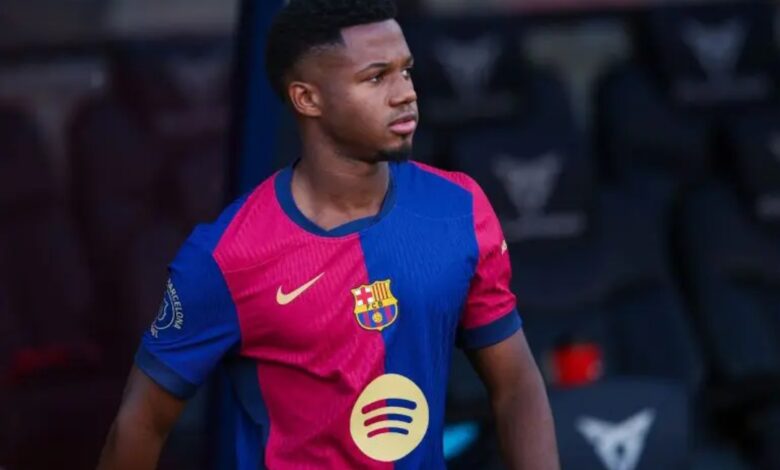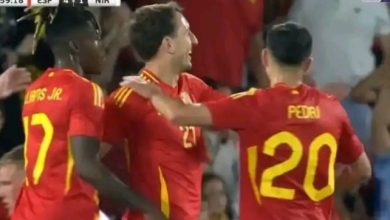
Rodri Sánchez’s transfer to Al-Arabi in Qatar took many by surprise, as most expected him to continue building his career in European football. The former Real Betis midfielder had shown flashes of brilliance in Spain’s La Liga, earning recognition for his technical ability and vision. Given his talent and youth, many assumed he would remain in a highly competitive European league where he could further develop his skills. Instead, he opted for a move to a lesser-known league, a decision that led some to question his ambition and long-term aspirations.
However, his choice to join Al-Arabi has proven to be a successful one. Sánchez has thrived in the Middle East, quickly establishing himself as a key player for his club. His strong performances have silenced many of his critics, demonstrating that a move outside Europe does not necessarily mean a decline in quality or ambition. His success in Qatar has also reignited conversations about young footballers who once showed immense potential but struggled to fulfill it due to injuries, lack of opportunities, or other career setbacks.
The Struggles of Ansu Fati
One such player who has faced a difficult journey is Ansu Fati, the former prodigy of FC Barcelona. The Spanish winger, once heralded as the natural successor to Lionel Messi, burst onto the scene as a teenager with a dazzling combination of speed, technical ability, and clinical finishing. His early performances captivated the footballing world, and for a time, he was seen as the future of Barcelona—a player who could carry the club forward in the post-Messi era. His meteoric rise was rewarded with the legendary No. 10 shirt following Messi’s departure, a symbolic gesture that reflected the club’s immense faith in his potential.
However, Fati’s career trajectory was soon disrupted by a series of devastating injuries. In 2020, a serious knee injury marked the beginning of his struggles, forcing him into multiple surgeries and extended recovery periods. Each time he seemed poised for a comeback, another setback followed, preventing him from regaining his peak form. The prolonged absence from regular football not only affected his physical fitness but also took a toll on his confidence. Despite Barcelona’s efforts to reintegrate him into the squad, he has struggled to make a meaningful impact, leading to growing doubts about his long-term future at the club.
Rodri Sánchez’s Perspective on Ansu Fati’s Struggles
Rodri Sánchez, who was once part of Barcelona’s famed La Masia academy, understands the challenges young players face when dealing with injuries and the subsequent loss of confidence. In an interview with SPORT, Sánchez shared his thoughts on Fati’s situation, expressing optimism that the young forward could still revive his career if given the right support and opportunities.
“Ansu is still very young, but he has been incredibly unlucky with injuries. It’s not just about the physical recovery—when you suffer multiple setbacks, regaining confidence becomes an even bigger challenge. He has outstanding talent and a natural ability in front of goal, but without consistent playing time, it’s difficult to showcase those qualities,” Sánchez explained.
“Despite the challenges, I truly believe Ansu has the potential to return to a high level. However, given the strong competition at Barcelona and the limited minutes he has received, it will not be an easy road.”
The Psychological Battle and Lack of Playing Time
One of the biggest concerns surrounding Fati’s current situation is his mental state. The confidence and fearless approach that once defined his playing style now seem to have faded. Where he once attacked defenders with ease and took risks in the final third, he now appears hesitant, often second-guessing himself. His lack of playing time under head coach Hansi Flick has further complicated matters, making it even more difficult for him to regain momentum. While injuries undoubtedly played a major role in his decline, Flick’s apparent lack of trust in his performances during training has also contributed to his limited appearances in matchday squads.
Should Fati Leave Barcelona to Revive His Career?
With his playing time severely restricted, many analysts and fans have begun to debate whether Fati should seek a fresh start away from Barcelona. His loan spell at Brighton during the previous season was meant to provide him with a chance to rebuild his confidence, but it did not produce the expected results. Some believe that another opportunity in a different environment—perhaps at a club where he would be a central figure—could give him the reset he desperately needs. Others argue that a permanent transfer might be the best option, as it would allow him to escape the immense expectations and pressures that come with playing for Barcelona.
Despite the uncertainty surrounding his future, Fati still holds one crucial advantage: time. At just 22 years old, he has plenty of years ahead to rediscover his best form. History has shown that many great players have endured difficult spells early in their careers before bouncing back and reaching their full potential. If he can find the right balance between fitness, confidence, and consistent playing time, he still has a strong chance of fulfilling the promise he once showed.
The coming months will be a defining period for Fati. Whether he chooses to stay at Barcelona and fight for his place or decides to seek a new challenge elsewhere, his next move will shape the course of his career. For now, the footballing world watches and waits, hoping to see the resurgence of a player who was once destined for greatness.




